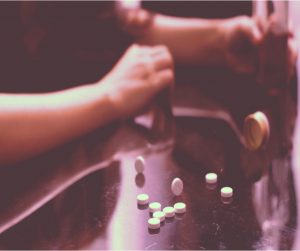[vc_row][vc_column][vc_cta h2="Help Is Only A Phone Call Away" txt_align="center" shape="round" style="flat" color="vista-blue" el_width="sm" use_custom_fonts_h2="true" use_custom_fonts_h4="true"]Call Now 855-227-9535[/vc_cta] Heroin addiction is described as compulsive drug-seeking behavior. A person who is addicted to heroin will continuously take the drug even when they are already suffering from its effects. They can’t say no to the drug anymore. Various neurochemical and molecular changes have occurred in the brain at this point, making the user unable to quit. Made from morphine, heroin is unlike other opioids that may be prescribed legally to treat pain. Heroin is a highly addictive substance that does not have any medical use. This is why it is important to discuss the effects associated with drug abuse and addiction. What happens when you get addicted? What are the side effects? Let’s find out.
The Side Effects of Heroin Abuse
 Side effects may vary from one person to another. It depends on a person’s drug habits, their age, their body mass, their health, and other factors. People usually abuse heroin because of the euphoric high that it produces. Users get a rush that usually ends in a “crash”. This initial high is then replaced by feelings of nausea, vomiting, and severe itching. The duration and intensity may also vary from person to person. Common physical side effects include shallow breathing, picking at skin, diarrhea, and clouded mental functioning. However, heroin users may also encounter serious medical side effects—some of which may result in death. This includes heart problems, chronic pneumonia, liver disease, arthritis, and seizures. Those who inject the drug directly into their bloodstream are also at risk of infectious disease and bacterial infections spread by shared needles. Heroin addiction is a serious medical disease. And so trying to quit heroin on your own is not a good idea. It should not be attempted at home, or without supervision from a medical professional. The addicted individual will surely go into withdrawal and they need someone to help manage the (potentially life-threatening) symptoms. Proper medical detox is done gradually by lowering the person’s dosage over time and then treating the symptoms. It should be done at a detox facility under a comprehensive drug treatment program.
Side effects may vary from one person to another. It depends on a person’s drug habits, their age, their body mass, their health, and other factors. People usually abuse heroin because of the euphoric high that it produces. Users get a rush that usually ends in a “crash”. This initial high is then replaced by feelings of nausea, vomiting, and severe itching. The duration and intensity may also vary from person to person. Common physical side effects include shallow breathing, picking at skin, diarrhea, and clouded mental functioning. However, heroin users may also encounter serious medical side effects—some of which may result in death. This includes heart problems, chronic pneumonia, liver disease, arthritis, and seizures. Those who inject the drug directly into their bloodstream are also at risk of infectious disease and bacterial infections spread by shared needles. Heroin addiction is a serious medical disease. And so trying to quit heroin on your own is not a good idea. It should not be attempted at home, or without supervision from a medical professional. The addicted individual will surely go into withdrawal and they need someone to help manage the (potentially life-threatening) symptoms. Proper medical detox is done gradually by lowering the person’s dosage over time and then treating the symptoms. It should be done at a detox facility under a comprehensive drug treatment program.
How do you know if someone is Abusing Heroin?
You don’t have to wait for these adverse effects to kick in before you start seeking treatment. If you think someone you care about is taking heroin recreationally, there are signs you can watch out for. Keep in mind that heroin is a “downer,” meaning it can slow down brain activity. It rapidly induces a state of euphoria, making the person feel relaxed. It also blocks the person’s ability to perceive pain. [maxbutton id="3" ] You may notice symptoms such as disorientation, dry mouth, shortness of breath, small pupils, and nodding off. They may exhibit sudden changes in behavior or actions. They may become sleepy after taking the drug. However, these signs mentioned above are not unique to heroin abuse, so there’s a chance that they are abusing some other substance; perhaps another opioid. Over time, the person may lose motivation or display apathy towards their future goals. They may spend less time on their own hygiene and physical appearance. You may notice a withdrawal from friends and family. If there’s reason to believe that your loved one is abusing heroin, look for an addiction treatment facility near you today.
The featured post The Dangers of Addiction: What are the Side Effects of Heroin Abuse? is available on RehabNear.me
from
https://www.rehabnear.me/heroin-abuse-side-effects/

No comments:
Post a Comment